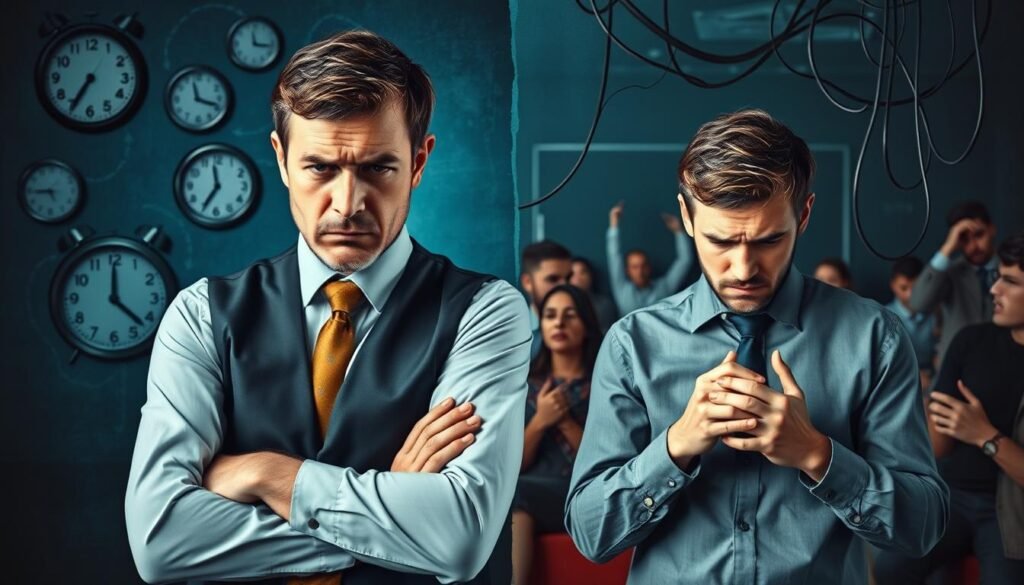Almost 14% of men in the United States will face an anxiety disorder at some point. Many don’t get diagnosed due to the stigma around male mental health. A lot of men suffer from anxiety without getting the help they need. It’s key to know the unique signs of anxiety in men to help improve their mental health.
Men often show anxiety differently, using anger, irritability, or turning to substance abuse. These behaviors hide their true condition and make it hard to get help. Also, society expects men to be strong, which makes them hide their feelings even more.
Understanding the unique signs of anxiety in men helps them get help sooner. Treatments like therapy, medication, and making changes in one’s life can really make a difference. Getting help for anxiety not only makes life better for men but also for their friends and family.
Key Takeaways
- Anxiety disorders affect approximately 14% of men in the U.S. during their lifetime.
- Men often manifest anxiety through irritability and strained relationships.
- Societal norms can hinder men from expressing their mental health struggles.
- Effective treatments include therapy, medication, and lifestyle changes.
- Substance abuse can be a common coping mechanism for anxiety in men.
Understanding Anxiety in Men
Anxiety is a complex condition that does not pick based on gender. Yet, men often show Male Anxiety Manifestations that are different from women’s. Society usually tells men not to show their feelings. This makes it hard for them to talk about their anxiety. Their symptoms may appear in ways that people don’t expect. This leads to misunderstandings about how serious their mental health issues are.
About 9 percent of men say they feel anxious or depressed every day. But men are less likely to be diagnosed with anxiety compared to women. Only about 20% of men are expected to face anxiety disorders in their lifetime. Sadly, less than half seek help from professionals. Therefore, many men suffer in silence without treatment or medication.
Genes and stressful events are key factors in developing anxiety. Bad habits like too much drinking can make it worse. Men have unique challenges with anxiety, including fears about sex and speaking in public. Not dealing with anxiety can lead to tragic results. Men are more likely to take their own lives than women. This is especially true in the U.S., where suicide rates are rising.
There are ways to cope that can help. Methods like cognitive behavioral therapy (CBT), exposure therapy, and medicines are effective. Learning about these treatments can pave the way for better Men’s Mental Health. As we talk more about these issues, it helps men to start their journey to healing.
Unique Symptoms of Anxiety in Men
Anxiety in men often shows up differently than in women. It’s vital to know these unique signs for better help. A lot of men show their anxiety through Masculine Anxiety Expression. They might seem angry or easily annoyed, unlike the common signs of worry or fear.
Emotional Expressions of Anxiety
It’s hard for men to talk about their anxious feelings. This can make them show their stress in unusual ways. Symptoms often seen in men include:
- Anger and frustration
- Irritability towards family and friends
- Withdrawal from social situations
This link offers more info on how these emotional reactions link to anxiety. These male anxiety symptoms are often missed, leading to stigma and less reporting.
Physical Manifestations of Male Anxiety
Men with anxiety also face physical issues. They include:
- Tension headaches
- Muscle pain or soreness
- Chronic fatigue
- Digestive problems
Mental and physical health are closely linked. It’s key to care for both the mind’s and body’s signals. Many men delay seeking help, which can worsen things. They might turn to unhealthy ways to cope, like drugs. Spotting these signs early can lead to better help and health.
Male Anxiety Manifestations
Anxiety in men often shows through anger and irritability. These are common signs. Society tells men to hide their feelings. This can make them act angrily instead of showing they’re anxious. These emotions get mixed up with normal stress. This makes things more confusing and frustrating for them.
Anger and Irritability
Many men with anxiety feel anger and irritability. About 14% of men in the U.S. face anxiety disorders each year. Almost 9% feel anxious or depressed daily. These feelings can turn into irritability. This makes it hard for them to get along with others. They try to appear strong, which can make them feel alone.
Strained Relationships as a Symptom
Stressed relationships show anxiety too. Men might not talk about their worries. This can ruin conversations with their loved ones. They might keep to themselves, causing more problems. Also, many use alcohol or drugs to feel better. About 58% have drunk alcohol in the last month. This hurts communication and relationships even more.
| Manifestations of Male Anxiety | Symptoms | Consequences |
|---|---|---|
| Anger and Irritability | Increased aggression, irritability, frustration | Conflict with others, difficulty in relationships |
| Substance Use | Alcohol and drug use to self-medicate | Relationship strain, health issues, increased anxiety |
| Communication Barriers | Inability to express feelings | Isolation, misunderstanding, emotional distance |
Offering support and being open to talk can help men deal with anxiety. It’s important they ask for help, but many don’t. Breaking the stigma about mental health is key. It leads to a better life and better relationships for men with these struggles. For more information, you should check out this blog.
Gender-Specific Anxiety Signs
Anxiety shows up differently between genders. The signs of gender-specific anxiety give us deep insights into how males and females express their feelings and behavior. These distinctions show us how society’s expectations shape our view of anxiety.
Differences Between Male and Female Anxiety
Men and women experience anxiety in different ways. Studies show that women are twice as likely as men to be diagnosed with anxiety disorders. 23.4% of women suffer from anxiety compared to 14.3% of men.
Men often hide their anxiety behind behaviors seen as acceptable, like anger or irritability. This makes it hard for others to see they are struggling with anxiety.
Common Misconceptions About Male Anxiety
There are several misconceptions about male anxiety. One common myth is that men don’t get as anxious as women, or their anxiety isn’t as serious. Many men use unhealthy ways to cope, like using drugs or alcohol, instead of getting help.
The stigma against talking about emotions makes it even harder for men to discuss their mental health. Understanding these wrong beliefs helps us offer better support to men dealing with anxiety.

The Impact of Societal Norms on Men’s Mental Health
Societal norms greatly affect men’s mental health, especially around anxiety. Masculine stereotypes push men to hide their feelings. This leads to a harmful pattern of buried emotions and neglected mental health. Many men feel much anxiety but avoid seeking help for fear of judgment.
Studies show a worrying trend: male suicide rates are climbing since 2000. Suicide is now the seventh leading cause of death for men. Men are four times more likely than women to take their own lives. This highlights the severe distress many endure. Each year, around three million men battle anxiety disorders. Many use substances to cope, often due to the pressure to appear tough.
This problem is even more acute for certain groups. For example, gay men experience higher suicide rates, which is troubling before age 25. This results from societal pressure and nonacceptance. On the other hand, many straight men avoid professional mental health support, allowing their issues to worsen. Almost half of the men do not seek help for anxiety or depression.
There are effective ways to tackle these issues. It’s crucial to encourage open conversations about mental health and to accept vulnerability. We need to support each other. It’s also important to challenge strict male stereotypes. By doing so, we can create a much healthier space for men’s mental health.
Masked Anxiety in Men
Masked anxiety means men often hide their anxiety under a show of toughness. They do this because society tells them it’s not okay to be emotionally open. This leads to many misunderstanding how anxiety in men appears, causing missed or wrong interpretations of their symptoms.
Defining Masked Anxiety
Masked anxiety in men leads to both emotional and physical issues. Instead of showing fear or sadness, men might seem irritable or angry. They often have muscle tension, especially in the neck and shoulders, mistaken for simple stress. Problems with digestion and sleep are also common as anxiety affects them inside.
How Masked Anxiety Affects Behavior
Masked anxiety changes how men act significantly. They might avoid others or overwork to avoid their anxiety, which makes them feel more alone. Turning to alcohol or drugs to feel better is a harmful choice. It makes their anxiety worse and hurts their relationships and health. Knowing the signs helps men get help sooner, improving their situation.

Atypical Male Anxiety Symptoms
Anxiety in men can look different than you might expect. It often shows in ways that aren’t typical. Many men use alcohol or drugs to fight off anxious feelings. They hope to feel better quickly. But this can lead them into a cycle of dependency. Using substances for relief only brings more problems, especially with addiction.
Using Substances as a Coping Mechanism
Many men use alcohol or drugs to deal with their anxiety. But this can cause more harm than good. It might feel like it helps at first, but it actually makes things worse. This can harm both their mental and physical health seriously.
Physical Health Issues Related to Anxiety
Anxiety doesn’t just affect the mind; it can hurt the body too. It can lead to heart trouble and tiredness that doesn’t go away. If anxiety isn’t treated, it can cause big health problems. Men might have a faster heartbeat, headaches, or stomach issues. Knowing this can help get them the right treatment early.
Understanding how anxiety shows up in men is key. Getting help can make life much better. Starting treatment early can help manage anxiety and keep you healthier. For more on coping with high anxiety every day, click here. This site has lots of useful info.
Understanding the Male Stress Response
Stress plays a big role in men’s health. It could be linked to 60 to 80 percent of visits to the doctor. It’s crucial to see how stress affects men differently.
When stressed, men often show a “fight or flight” response. They might choose to be alone instead of seeking help. This can make them feel more alone and anxious. They might keep their stress inside and not seek help. This can make their mental health even worse.
Stress comes from many areas like home, work, and personal relationships. It can cause serious health issues like erectile dysfunction (ED), hormone problems, and stomach issues. For example, stress can lower testosterone which may lead to ED.
Chronic stress can also raise blood pressure and cholesterol. This increases the risk of heart disease. It can weaken the immune system and cause more sickness. Stress can also lead to chronic pain in the neck, shoulders, and back.
However, there are ways to manage stress well. It’s important to take care of yourself, get support, and stay active. Finding hobbies and getting professional help can ease stress. Knowing how to handle stress well is key to a healthier life for men.
| Health Issues Related to Stress | Impact on Men’s Health |
|---|---|
| Erectile Dysfunction | Stress related to personal and professional pressures can lead to ED. |
| Cardiovascular Disease | Chronic stress increases blood pressure and cholesterol levels. |
| Gastrointestinal Problems | Stress can cause issues like constipation and heartburn. |
| Chronic Pain | Increased pain sensitivity may affect men’s neck, shoulders, and back. |
| Infertility | Stress affects testosterone levels and sperm production. |

Recognizing Men’s Anxiety Experiences
Understanding men’s anxiety involves knowing the unique triggers and their effects if ignored. Men face daily pressures that can trigger anxiety. These include work stress, relationship challenges, and feelings of not being good enough. Spotting these signs early is key to managing them well.
Common Triggers of Anxiety in Men
Several factors can spark anxiety symptoms in men. The following are common triggers:
- Work-related stress and job insecurity
- Relationship difficulties and family issues
- Social pressures and failure to meet societal expectations
- Low self-esteem and feelings of inadequacy
- Significant life changes, such as divorce or loss of a loved one
Knowing these common triggers of anxiety in men can help greatly. It enables better symptom management. This prevents symptoms from getting worse.
Long-term Effects of Untreated Anxiety
Ignoring anxiety can have serious effects. The long-term effects of untreated anxiety include:
| Consequences | Description |
|---|---|
| Chronic health issues | Anxiety can lead to heart disease, gastrointestinal issues, and ongoing pain. |
| Relationship breakdowns | Struggles with loved ones may cause feelings of isolation. |
| Escalation to severe mental health issues | There’s a higher risk of depression and suicidal thoughts. |
| Work performance issues | It can be hard to focus, risking one’s job or position. |
It’s vital to recognize men’s anxiety for a supportive environment. Open talks on mental health and seeking help are critical. Early help leads to better life quality and emotional health.
Effective Coping Strategies for Anxiety
Understanding how to cope with anxiety is important for men’s mental health. Regular exercise is highly recommended. Aim for at least 2½ hours of moderate exercise each week. Try to include vigorous activities for about 1¼ hours as well. Doing exercises consistently, about 30 minutes three to five times a week, is better than occasional intense workouts.
Finding fun exercises can boost motivation. Working out with a friend can also help you stay on track. If you use substances like alcohol to ease anxiety, be aware of dependency risks.
Another key strategy is seeking therapy, such as cognitive behavioral therapy (CBT). It helps men change their thinking patterns. Even high-profile individuals like NBA star Kevin Love battle anxiety.
Talking about mental health with peers helps create a supportive space. Don’t forget about additional help, like consulting a doctor for meds or seeing specialists. Adding mindfulness practices to your day helps too. Learn more about various coping strategies for anxiety. Living a balanced life boosts overall happiness.
Mixing activities and expert advice makes you stronger against anxiety. Sharing what works for you helps build a stronger community. Using these tips offers both quick relief and lasting well-being.
Conclusion
It’s key to understand how anxiety affects men differently. This helps raise awareness about men’s mental health. Around 14.3% of men in the U.S. face anxiety. That makes it a common issue, yet many hesitate to seek help due to stigma.
Anxiety in men can show up in unique ways, like physical symptoms or trying to solve problems alone. Special Anxiety Treatment Options are available. Things like talking therapies, being open, and mindfulness can help a lot. It’s about helping men build emotional strength.
Talking more about Men’s Mental Health Awareness can break down stigma. It encourages men to share their feelings and get help. As we understand anxiety better, it’s crucial to support men in dealing with their struggles. If you’re dealing with worries in relationships, check out this informative page for help.